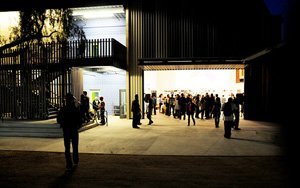 The School of Media, Culture, and Design, Woodbury University in Burbank, California, a few miles from Los Angeles, consists of five departments that are well-integrated with the large media industry in the area. After the accreditation auditors expressed concern over the governance and cooperation between the five departments of the School of Media in 2007, the dean suggested they adopt sociocracy/dynamic governance. Enrollment was declining, there were no cross-disciplinary degrees, and management styles varied significantly. The department heads began working with sociocracy consultant John Buck.
The School of Media, Culture, and Design, Woodbury University in Burbank, California, a few miles from Los Angeles, consists of five departments that are well-integrated with the large media industry in the area. After the accreditation auditors expressed concern over the governance and cooperation between the five departments of the School of Media in 2007, the dean suggested they adopt sociocracy/dynamic governance. Enrollment was declining, there were no cross-disciplinary degrees, and management styles varied significantly. The department heads began working with sociocracy consultant John Buck.
A year later, the accreditation auditors praised the School’s governance as “unconventional and successful… worthy of study by other schools.” By 2010, the tuition revenue was up 10% when the University enrollment had fallen 1%. In 2012, it was 26% above 2011. The school was also able to attract $3.5 million in grants.
According to Dean Eddie Clift, [sociocracy] creates a culture of respect and provides a new way to look at problems:
[Sociocracy] allowed people to focus on the reasons they came to work here in the first place—education and innovation. We saw improved quality of life for the faculty, including better work/life balance. We know—through increasing student enrollment, and increasing student placements in the industry thanks to a clearer connection with the industry—that we are providing a valuable education for our students. And best of all for me, my faculty and chairs are so effective now; they’re confident and satisfied with their work. The School basically runs itself. That makes my job a pleasure!
Based on a case history by the Sociocracy Consulting Group, “Collaboration and Trust Among Departments: Woodbury University, School of Media, Culture, and Design.”
Categories: Collaborative Organizations, In the Workplace, Schools

